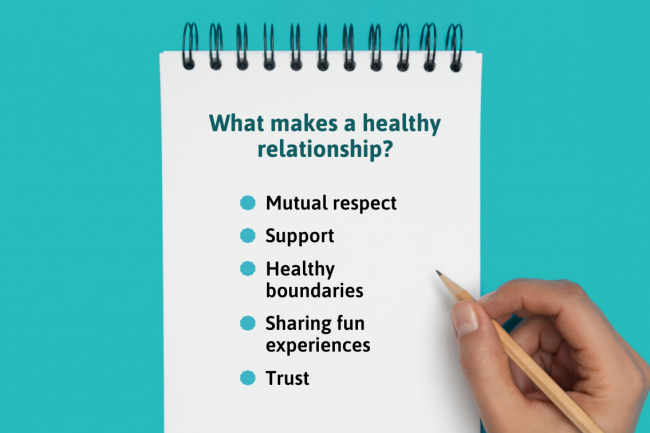You’ve probably seen references to “self-love” and “self-compassion” in self-development articles or on social media. But what do these terms actually mean? In this article, you’ll learn what self-love and self-compassion look like and how you can develop both.
What are self-love and self-compassion?
Self-love and self-compassion are separate but related concepts. Self-love involves accepting, appreciating, and nurturing yourself while investing in personal growth.[1] Self-compassion entails showing yourself warmth, help, and understanding during difficult times.[2]
Sections
- How to love yourself more
- What is self-compassion?
- The benefits of self-compassion
- How to show yourself compassion
- Myths about self-love and self-compassion
How to love yourself more
People who love themselves value their own well-being and happiness. They support themselves unconditionally, even when they make mistakes.[1] To love yourself means to believe that you are a worthy human being who is no less valuable than anyone else.[1]
Many of us don’t find it easy to show ourselves love. Fortunately, it can get easier with practice. Here are some strategies and techniques to try.
1. Adjust the expectations you have of yourself
It’s good to have goals and ambitions, but putting yourself under pressure to be perfect or to be “the best” at something often leads to stress and disappointment because no one does everything brilliantly all of the time. Instead, treat yourself with love and kindness by setting challenging but realistic goals.
Check out our guide to setting goals and making them happen.
2. Invest in supportive, healthy relationships
The people you spend time with can have a big impact on the way you feel about yourself. If your friends or family say or do things that make you feel bad, it may be time to try making some changes in your relationships.

If you’re in a toxic relationship, letting it go may be one of the most loving things you can do for yourself. People who love themselves know that they don’t deserve to be bullied or abused. Our articles on signs of a toxic friendship and types of toxic friends will help you learn how to spot toxic people and relationships.
3. Do things you’re good at
Look for opportunities to do things you like and can do well. Let yourself take pride in your skills and talents. If you can’t think of any activities you like to do, challenge yourself to find a new hobby or learn a new skill.
4. List the things you like about yourself
Reading a list of your best qualities, traits, and achievements can give you a boost when you start criticizing yourself. Make your list as long as possible and keep it close to hand. Add to the list when you learn a new skill or find a new quality to appreciate about yourself.
5. Challenge unhelpful beliefs about yourself
It’s difficult to love yourself if you have unhelpful, negative views about yourself. When you notice a self-critical thought, try to take a step back and challenge it.
It can help to ask yourself these questions:
- Is this belief really true, or am I making a sweeping negative statement?
- Can I think of a replacement positive thought that is both realistic and helpful?
For example, let’s say you think to yourself, “I have no social skills and will never make friends. I’ll be lonely forever.”
A more realistic, helpful thought might be, “At the moment, I’m not very confident in my social skills, and I find it hard to make friends. It will take time and practice to become more comfortable around other people, but it’ll be worth the effort.”
See our article on how to stop negative self-talk for more advice.
6. Ask for help when you need it
When you feel overwhelmed by life and need support, show yourself some love by reaching out to people or organizations who can help. Do not force yourself to struggle in silence.
- Access therapy via student support services or your employee assistance program
- Talk to a trusted friend or relative about your feelings
- Reach out to charities or helplines that offer mental health support. United For Global Mental Health has a resources page you may find useful.
- Ask your doctor for a referral to a mental health professional
We recommend BetterHelp for online therapy, since they offer unlimited messaging and a weekly session, and are cheaper than going to a therapist's office.
Their plans start at $64 per week. If you use this link, you get 20% off your first month at BetterHelp + a $50 coupon valid for any SocialSelf course: Click here to learn more about BetterHelp.
(To receive your $50 SocialSelf coupon, sign up with our link. Then, email BetterHelp’s order confirmation to us to receive your personal code. You can use this code for any of our courses.)
7. Practice self-care
Taking good care of your body and mind is a tangible and powerful way to show yourself love.
Here are some self-care ideas to try:
- Eat a healthy, balanced diet
- Aim to sleep for 7-9 hours of sleep each night[3]
- Take regular exercise. Aim for at least 150 minutes of moderate activity per week.[4]
- Cut back or eliminate alcohol
- Keep caffeine within reasonable limits. If you suspect it makes you jittery or anxious, cut back.
- Evaluate your media habits. If you often watch, read, or listen to things that make you feel depressed, inferior, or angry, find some alternatives that leave you feeling more positive.
8. Stay true to your values
It can be difficult to like or love yourself when your actions don’t match your values. Try to stand up for your beliefs and behave with integrity, even if that means going against the majority.
For example, let’s say you value kindness but stay silent in a group conversation while other people gossip or spread nasty rumors because you feel afraid to speak up.
Although it may be difficult to say no to group behavior, by saying “I don’t want to take part in this” or “I’d prefer not to gossip about other people,” you’d probably feel better about yourself if you stand by your values instead of staying quiet or joining in.
You might find these practical tips on how to be yourself helpful.
9. Stop making unhelpful comparisons
It’s too simplistic to say that comparing yourself to others is always bad. Sometimes, comparing yourself to someone who has what you want can inspire you to make positive changes.[5]
But comparisons can also make you feel as though you are lacking in some way.[6] If you tend to make unhelpful comparisons that leave you feeling low and inferior to others, removing triggers can help.
For example, if you tend to compare yourself to people on social media and beat yourself up because they seem to be happier, better-looking, or richer, it might be best to start limiting the amount of time you spend online.
10. Celebrate your progress
Give yourself permission to celebrate yourself when you succeed. This doesn’t mean bragging or telling everyone how great you are—it just means giving yourself some much-deserved praise and recognition. This may feel strange at first, but in time, you might be able to teach yourself that your achievements matter as much as anyone else’s.
When you achieve a goal, give yourself a treat. It doesn’t have to be expensive. You could buy a couple of new books, see a movie, or just take an afternoon off and relax in your garden.
11. Work on your body image
Many of us feel self-conscious about our looks and find it hard to love our bodies. Body image may sound like a trivial issue, but it’s important. Loving yourself is difficult if you can’t feel confident about your body.

Here are some tips for healing body image that will help you cultivate confidence:
- Think about the media you consume and cut back if necessary. For example, scrolling through social media accounts or reading magazines that feature lots of airbrushed, seemingly perfect men and women probably isn’t a great idea if you feel insecure about your body.
- Choose clothes and accessories that make you feel good. Give yourself permission to wear what you like, not what other people think you should wear.
- Focus on what your body can do for you instead of what it looks like.
- If loving your body feels like an impossible goal, aim for body acceptance instead. We have an article on practicing body neutrality which may help.
What is self-compassion?
Psychologist Kristin Neff’s definition of self-compassion is made up of 3 elements: self-kindness, common humanity, and mindfulness.[2]
1. Self-kindness
Self-kindness involves treating yourself in a warm, understanding way when you experience difficult emotions or fall short of your own expectations. It means speaking to yourself with love and patience instead of criticizing or berating yourself. Self-kindness also entails acknowledging fear, sadness, and other difficult feelings instead of ignoring them.
2. Common humanity
Common humanity involves recognizing that everyone has problems and realizing that suffering is a universal human experience. Reminding yourself of this simple truth can help you feel less isolated when life gets tough.
3. Mindfulness
Mindfulness is a state of awareness. When you are mindful, you notice and accept uncomfortable emotions instead of trying to fight or change them. By gaining space from your feelings, you might find them easier to manage.
If you’d like to measure your own level of self-compassion, you can try Neff’s self-compassion scales for free on her website.
The benefits of self-compassion
Researchers have found that being good to yourself has several benefits. Here are a few findings that show the power of self-compassion:
1. Self-compassion can reduce perfectionism
Because self-compassion involves accepting personal mistakes, it’s unsurprising that it tends to be negatively correlated with perfectionism.[7]
This relationship is significant, because research shows that perfectionism can increase your risk of mental health problems such as depression.[8][9]
2. Self-compassion makes you more resilient
Self-compassion can help you get through difficult times. For example, studies have found that self-compassion can make it easier to cope with divorce and other challenging life events.[2]
3. Self-compassion can improve your relationships
Self-compassion doesn’t just improve your well-being; it also benefits your partner. People who show themselves compassion tend to have healthier, more caring romantic relationships.[10]
How to develop your self-compassion
The following practices can help you take a more compassionate attitude toward yourself. They may be especially useful when you’re under stress or feel overwhelmed by negative emotions.
1. Ask yourself, “What would I say to a friend?”
It’s often easier to speak kindly to a friend than it is to speak compassionately to yourself. If you catch yourself using negative self-talk, pause and ask yourself, “What would I say to a friend?”
For example, let’s say you failed an exam. If you tend to be self-critical, you might tell yourself, “You’re stupid. The test wasn’t even that hard. Why do you always mess things up?”
But if your friend told you that they’d failed an exam and that they were feeling stupid, you wouldn’t speak to them in the same way. Instead, you’d probably say something like, “It’s disappointing, but you can take the exam again. Failing an exam doesn’t mean you’re stupid. Lots of people don’t get the results they’d like, and it doesn’t mean they won’t succeed in the future.”
2. Write yourself a self-compassion letter
Self-compassion letters can help you come to terms with parts of yourself that make you feel insecure, embarrassed, or unashamed. You could try writing a letter from the perspective of a compassionate friend or from the compassionate part of yourself.
Begin by acknowledging your feelings. For example, you might write, “I know you feel insecure because your best friend seems too busy to hang out at the moment, and it feels like the friendship is fading.” Go into as much detail as you like.
Next, write about any aspects of your history or experiences that could be contributing to your feelings. For example, if you were often bullied at school, you may be especially sensitive to rejection as an adult. Do not criticize or condemn yourself; remember that all your feelings are valid.
Finally, try to suggest one or two things you could do to improve your situation. Use a patient, gentle tone. Avoid harsh, absolutist language like “You must” or “Why don’t you just…”
For example, you might write, “You could try reaching out to a couple of other friends this week. It could be a first step towards building other, stronger friendships. Maybe send her a text and ask her if she’d like to meet up?”
3. Accept your mistakes and learn from them
Self-forgiveness is a key part of self-compassion. Self-forgiveness doesn’t mean letting yourself off the hook when you’ve done something wrong or believing that everything you do is wonderful. It means recognizing that everyone makes mistakes, and understanding the importance of moving on instead of beating yourself up.
It can be easier to move on from a mistake if you make a conscious effort to understand precisely what happened and how you can prevent it from happening again.
When you’ve slipped up, try answering these questions:
- Why exactly did I make this mistake? (e.g., “I forgot a lunch date with my friend because I was distracted by a problem at work.”)
- Realistically speaking, what are the long-term consequences of my mistake? Am I blowing things out of proportion? (e.g., “My friend was hurt and annoyed, but I apologized, and my mistake doesn’t seem to have damaged our friendship. I messed up, but it’s not the end of the world.”)
- What did I do, if anything, to make up for the mistake? (e.g., “I called and apologized to my friend and offered to buy them lunch at a fancy restaurant the following weekend.”)
- What steps have I taken to prevent myself from making a similar mistake in the future? (e.g., “I’ve started scheduling reminders on my phone so that I don’t miss any appointments or events.”)
Our guide to letting go of past mistakes contains more tips that may help if you feel stuck in the past.
4. Find a kinder way to motivate yourself
You may think that self-criticism can be a good source of motivation. But being hard on yourself isn’t always the best way to encourage change.
Instead, try asking yourself, “What would a wise, kind mentor say to help me change?” For example, beating yourself up for being overweight will probably make you feel defeated and unhappy rather than inspired.
Your imaginary mentor might say, “OK, so you want to lose 30lbs. That’s a big goal, but it’s doable with time and effort. So, what realistic changes could you make? Maybe you could start by switching soda for sparkling water and eating fruit for snacks, instead of chips?”
5. Give yourself a hug
Soothing physical contact, including hugs, triggers your body to release a chemical called oxytocin.[11] Oxytocin, which is also known as the “bonding hormone,” triggers feelings of love, calm, and security. When you’re feeling tense or self-critical, try giving yourself a hug or stroking your arms.
6. Give yourself a self-compassion break
When you’re in a stressful situation, a self-compassion break can help you to stay calm and treat yourself gently.
Here’s how to do it:
- Find a quiet place to sit or lie down.
- Acknowledge your feelings. For example, you could say to yourself, “At the moment, I am feeling overwhelmed” or “Right now, I am suffering.”
- Remind yourself that everyone suffers; it’s part of life. Remember that suffering connects us because no one escapes it.
- Place one hand over your heart. Say to yourself, “May I show myself kindness,” or a similar phrase that feels right to you.
7. Practice mindfulness
To be mindful is to observe reality, including your thoughts and feelings, without judging them. Mindfulness is sometimes described as “being in the moment.”
Grounding exercises can help you remain mindful. When you next feel overwhelmed, challenge yourself to tune in to all your senses. What can you see, hear, touch, smell, and taste?
Listening to a guided meditation can also help you enter a mindful state. You can listen to some free recordings on Tara Brach’s website. You could also try a meditation or mindfulness app such as Smiling Mind.
Myths about self-compassion and self-love
Self-compassion and self-love are increasingly popular concepts, but they aren’t well understood.
Here are some of the most common misunderstandings people have about self-compassion and self-love:
- Myth: Showing yourself love and compassion will make you lazy.
Truth: Giving yourself support and encouragement can inspire you to do your best and look forward to the future rather than dwelling on past mistakes. - Myth: People who love themselves are narcissists.
Truth: Healthy self-love and self-appreciation are not the same as narcissism, which usually manifests as a sense of entitlement.[12] - Myth: Self-love and self-compassion are signs of weakness.
Truth: It takes courage to admit that you are struggling. It also takes courage to confront and accept your unique set of strengths and weaknesses. - Myth: Self-compassion is the same as self-pity.
Truth: Self-pity is self-centered, whereas self-compassion is about recognizing that everyone suffers and faces problems. - Myth: Self-love and self-compassion are the same as self-care.
Truth: Taking care of yourself, for example, by eating well and giving yourself time to relax, is a way to show yourself self-love. But self-love isn’t just an action; it’s a general attitude of acceptance and approval.




